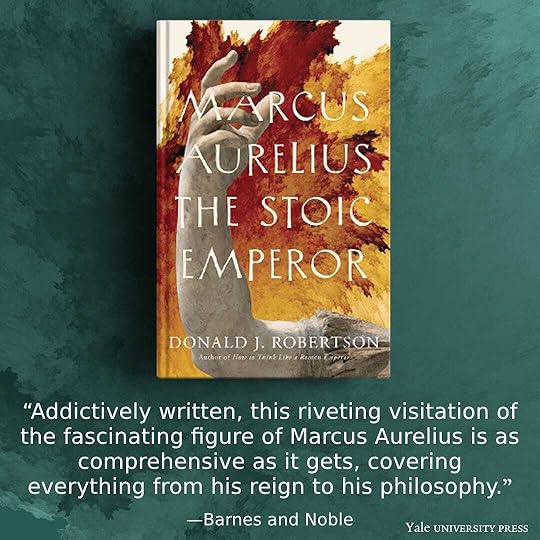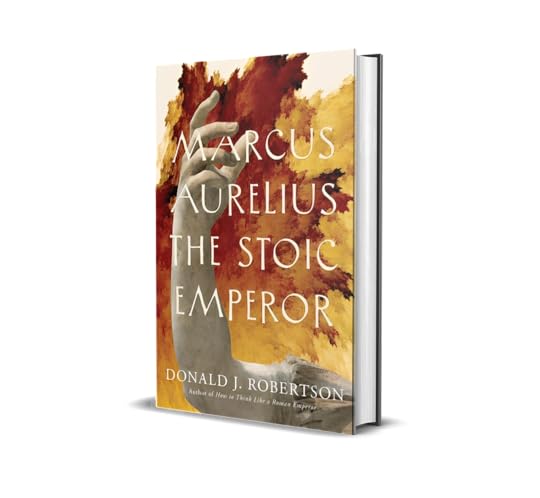From the Mother of Caesar
This is an excerpt from my forthcoming biography Marcus Aurelius: The Stoic Emperor, published by Yale University Press as part of their Ancient Lives series. Available for preorder now in hardback and ebook formats from Amazon, Barnes and Noble, and all good bookstores. (I narrated the audiobook myself, which will be available soon.)
 Chapter 1: The Mother of Caesar
Chapter 1: The Mother of Caesar“Piety and kindness,” writes his frail hand, listing qualities the author learned from his mother, “and abstinence not only from evil deeds, but even from evil thoughts.” Marcus Aurelius is in his fifties. It is late at night and the frigid winter air of Aquincum (modern-day Budapest) has brought on his familiar hacking cough. As usual, he has difficulty sleeping. Outside the praetorium, his headquarters at the center of the legionary fortress, everything is deceptively silent. The Praetorians, his personal regiment, are camped in nearby barracks. The whole empire has been devastated by a horrific pandemic, which would eventually be named the Antonine Plague, after Marcus Aurelius Antoninus’s imperial dynasty. The First Marcomannic War still rages along the Danube frontier. The army is exhausted from fighting one battle after another against the enemy tribes, the Quadi and Iazyges, on t he other side of the river. In the midst of all these troubles, the emperor is writing his personal notes on the application of Stoic philosophy. He pauses momentarily to gaze upon a wood-panel portrait of Lucilla, his mother. Slowly turning over the lesson that he learned from her half a century earlier, he must have asked himself, How can a man learn to abstain even from the very thought of doing wrong?
Stoicism: Philosophy as a Way of Life is a reader-supported publication. To receive new posts and support my work, consider becoming a free or paid subscriber.
Domitia Lucilla, also known as Domitia Calvilla, gave birth to her first child, Marcus Annius Verus—the future Roman emperor Marcus Aurelius—on April 26, 121 CE. His only sibling, a sister named Annia Cornificia Faustina, arrived a year later. The children were born into a wealthy patrician family with close ties to Hadrian, the ruling emperor. Later, Marcus would study under several of Rome’s finest rhetoricians and philosophers, but Lucilla, his mother, would have been his first teacher.
She also taught him to pay close attention to his thoughts and look deep within himself, examining his own motives and values.
They were clearly very close. Long before Marcus began any formal education, his mother had sown within him the seeds of a love for Greek literature and philosophy. She also taught him to pay close attention to his thoughts and look deep within himself, examining his own motives and values. Doing good outwardly is not enough; the real goal of life is to be good in ourselves.
“Look within. Within is the fountain of good, and it will ever bubble up, if you will ever dig.”
Lucilla’s early concern with moral self-examination bore fruit for her son throughout his life, but most notably decades later, when he began writing the Meditations.
“My little mother,” Marcus calls her affectionately in his letters, but she must have commanded great respect as one of the wealthiest and most powerful women in Rome. From her parents she had inherited extensive clay fields, and a large brick-and-tile factory on the banks of the Tiber, which had produced the materials used in the construction of the Colosseum, Pantheon, and Market of Trajan. Archaeologists have unearthed many bricks with her name stamped on them; it would appear that Marcus’s “little mother” was one of the leading magnates of the Roman construction industry at the start of the second century CE. Marcus admired her exceptional generosity (today we would call her a philanthropist), and he later expressed gratitude that thanks to her he had the resources to help those who were short of money or needed other forms of assistance.

Marcus grew up around his mother’s circle of friends, who included some of the leading intellectuals in the empire. Lucilla was a natural Hellenophile. Indeed, her side of the family claimed descent from a legendary king, Malemnius, who founded a prominent city on Italy’s Salentine peninsula, Lupiae, where Greek colonists had settled in the distant past. (The surrounding region to this day retains strong cultural ties to Greece.) Roman Hellenism ran in her veins, and she was known for her exceptional grasp of the Greek language. Fluency in Greek had been fashionable since the latter part of Nero’s reign, half a century earlier, when Rome experienced the renaissance in the appreciation of Greek culture known as the Second Sophistic. The Sophists were Greek orators who discussed literature with their students but also claimed to impart moral lessons about virtue. Hence, the word sophistication , the quality that the parents of young Roman nobles hoped their sons might acquire from foreign intellectuals. Although most wealthy Romans at this time were bilingual in the two languages, Lucilla’s exceptional mastery of Greek is evident. Marcus Cornelius Fronto, the preeminent Latin rhetorician of his day, wrote letters in Greek addressed “To the Mother of Caesar” and somewhat pathetically begged Marcus to proofread one: “I have written your mother a letter, such is my assurance, in Greek, and enclose it in my letter to you. Please read it first, and if you detect any barbarism in it, for you are fresher from your Greek than I am, correct it and so hand it over to your mother. I should not like her to look down on me as a goth.”
Thank you for reading Stoicism: Philosophy as a Way of Life. This post is public so feel free to share it.



